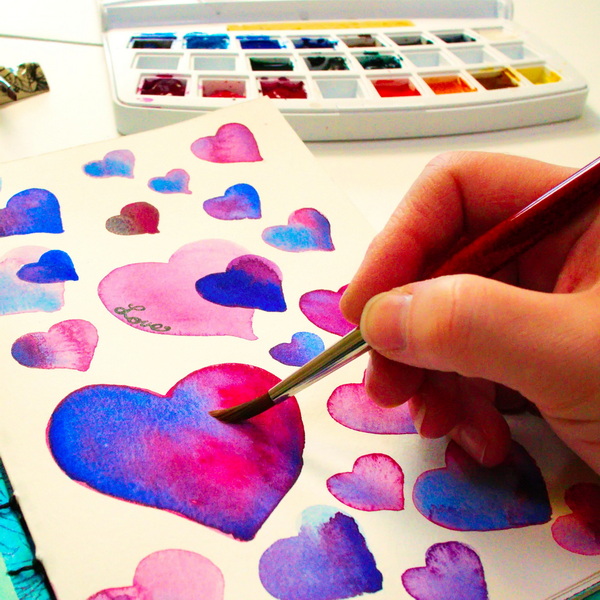
How to Get Comfortable with Your Watercolors
Are you new to watercolor paints or have recently purchased a new set of watercolors? Watercolors are a wonderful medium but every new color or set of colors can take time to get used to. The colors may act differently than what you’re accustomed to, which can cause frustration.
So how do you get comfortable with a new set of watercolors? I recently purchased a new set of Russian watercolor paints called White Nights at my local art store. I wanted to share with you my process and the exercises I use to get familiar with the paints and color combinations. We’ll be creating a simple watercolor painting in our art journal. This gives us a place to practice and learn how to use our watercolors.
Hop-A-Long Studio is reader-supported. When you buy through links on our site, we may earn an affiliate commission at no cost to you. Learn more.
Tubes or Pan Watercolors?
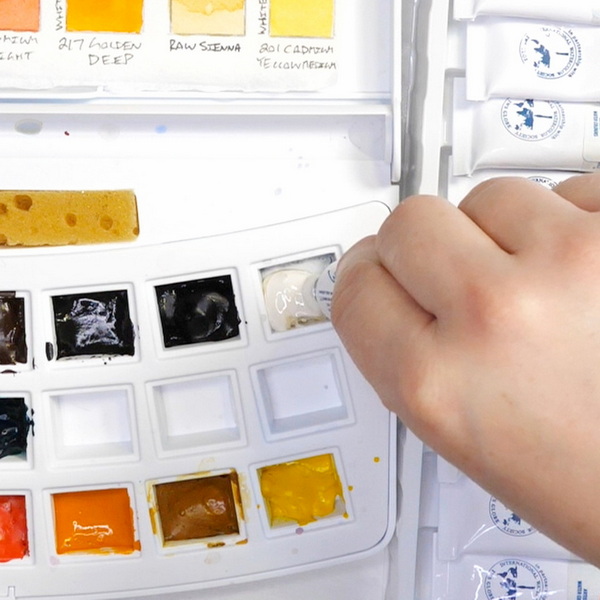
If you are new to watercolor paints you may have purchased a set of watercolors in pans which give you a variety of colors. This is a great option because you can start using them right away.
The other option is to purchase an empty watercolor palette and tubes of watercolor. Usually the tubes of watercolor are the better value as usually I am able to fill my pans several times with one tube of watercolor paint. Take the lid off the paint and squeeze the paint into one of the watercolor pans until you fill it.
Metal Seals on Watercolor Tubes
The one thing I didn’t like about this set of White Nights watercolor paints is that they had metal seals on the paints and no tool provided for puncturing them. This is the first set of watercolors that I have owned that didn’t have a puncture tool to help you break the seal.
If you run into this problem, use a craft knife to puncture the seal. It is a bit messier because you’ll end up with paint on the knife. The pressure from the tube will cause some of the paint to spill out. So make sure that you’re holding it over your watercolor pan.
You Might Not Know…
Once you add the watercolor to the pans, you can let it dry and use it over and over again. A student I recently taught didn’t realize that you were supposed to add the tube watercolor pans and let them dry before using them.
Her assumption was that any of the watercolor you squeezed out would need to be used right away, like acrylic paint. She thought tubes of watercolor were wasteful because you would have to throw out anything you didn’t use at that painting session. That is not the case. Whether or not you put the watercolor in a pan or just on a palette, it can be rewetted repeatedly until all the paint it used up.
Should I Use My Watercolors Wet or Dry?
I know artists that love using watercolor paints straight out of the tube while it’s still wet. My preference is to add them to the pan and let them dry completely. I get more consistency in color and less paint waste than using the watercolor paints straight out of the tube. It’s a personal preference and depends on the techniques you are using. After I squeeze the paints into the pan, I leave the watercolor set open to the air for 24 hours to help the watercolor paint harden.
Creating Sample Sheets for Watercolors
Create a Sample Sheet for Your Watercolor Palette
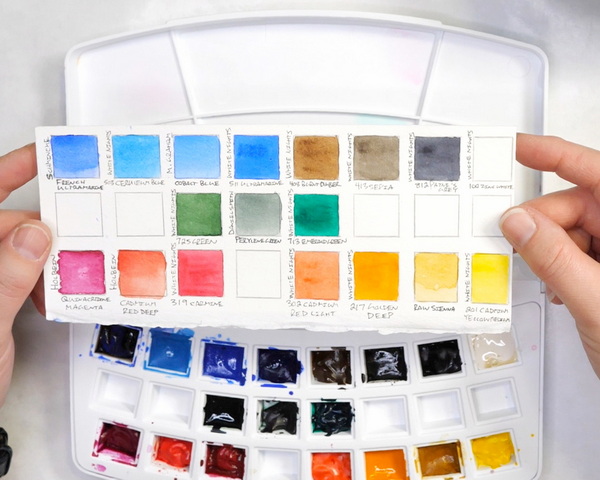
When watercolor paint is in the pans, it is a concentrated watercolor pigment. It can be hard to see the color that you will get on a paper surface. I create a small sample sheet using a piece of watercolor paper that I place in my watercolor set for reference. This way I never have to guess what the watercolor paints will look like on my project. I always have a reference to help me.
Creating a Swatch Sheet with Primary Colors
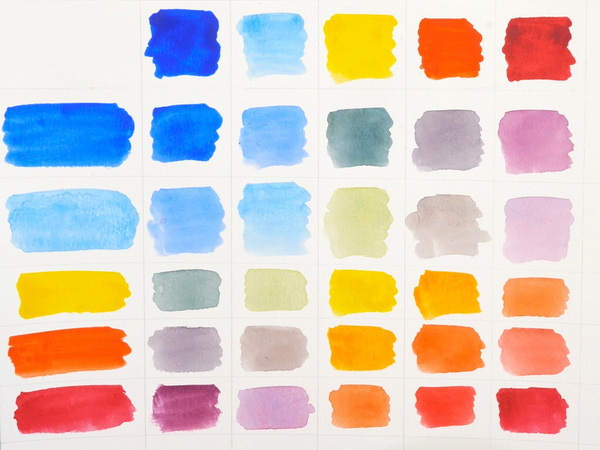
One of my favorite ways of getting comfortable with my new colors is to create a swatch sheet. To create a swatch sheet, take a warm and cool blue, warm and cool red and warm and cool yellow from your set of watercolors. Draw a grid, add these colors to the top and to the side of the sheet. Mix half of each color together and fill the spot on the grid. This is a simple way to start playing with color mixing and help you get comfortable with your watercolors.
An Easy Art Journal Project with Watercolor Paints
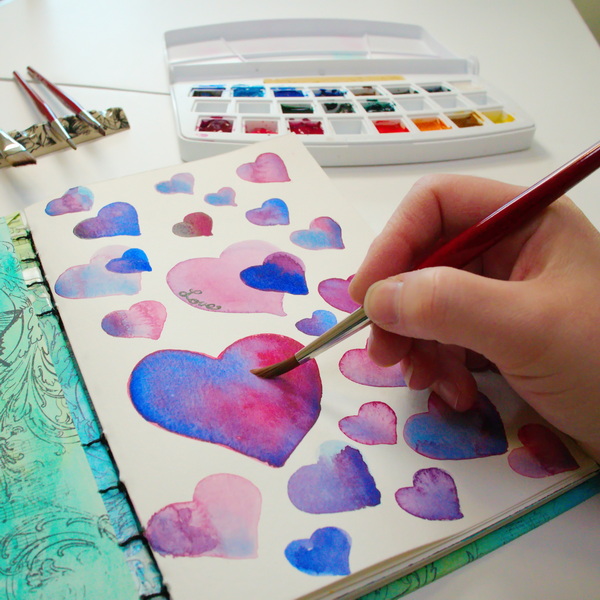
If you’re looking for a fun and easy way to start experimenting with your watercolor paints in your art journal, start with a basic shape. This can be a circle, square, or any shape that is easy for you to create. As Valentine’s Day is just around the corner, I thought I would use a heart shape for this page.
Adding Basic Shapes to Watercolor Paper
Start by adding your basic shape to your watercolor paper. You can choose to add the shapes randomly or in a pattern. Add the pure color mixed with water from the pan or you can play with some of the color mixes that you created in your swatch sheet.
For this exercise, I started by using Ultramarine Blue to create hearts. I used the blue both in the full intensity color and watered down paint for lighter values. This is called a wet on dry watercolor painting technique.
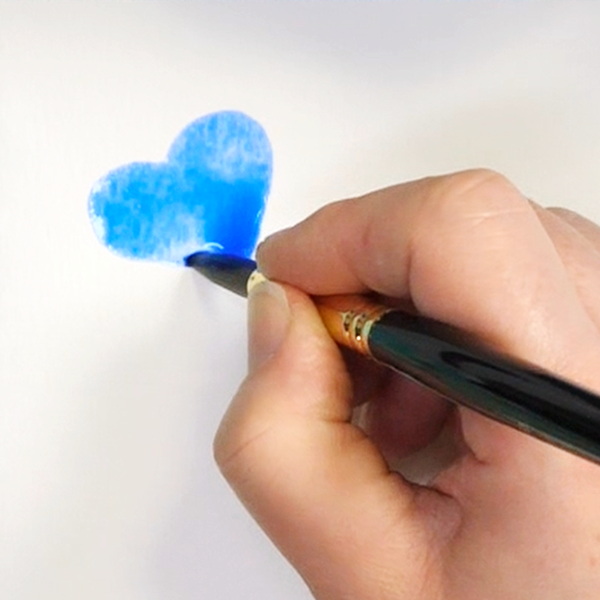
Using Carmine, I drop in small strokes of red into the wet blue paint. This allowes the colors to meld and move together creating interesting color combinations. This is called a wet-on-wet watercolor painting technique.
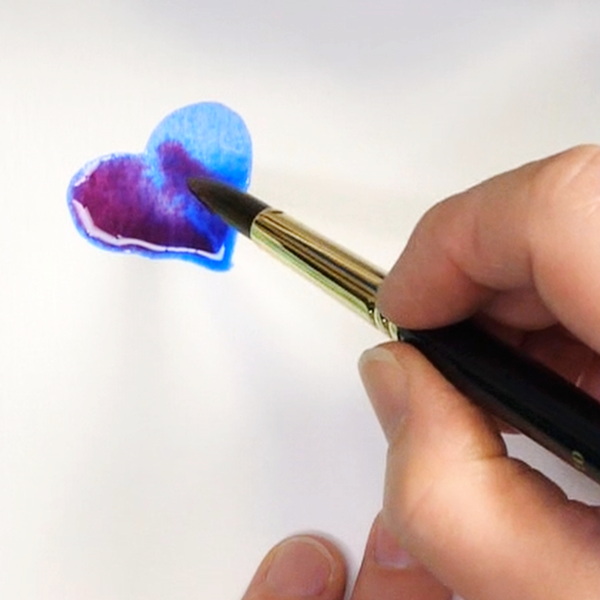
You can also mix the carmine and ultramarine blue together to create a beautiful purple. You can paint your hearts with this and use the wet on wet to drop in deeper purple, blue or red into the heart. I also created a different mix of purple using Cerulean Blue and Carmine Red watercolor paint.
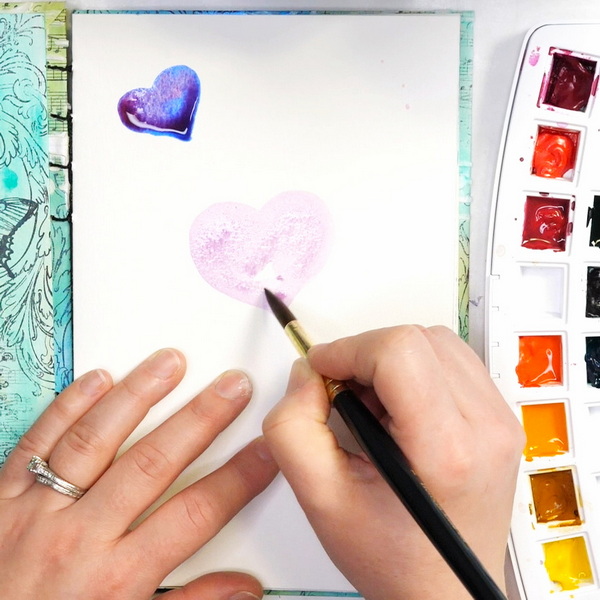
As you can see, by using just a few colors you can start playing with different mixes of color to get a range of blues, reds, and purples. For this project, I only used 3 colors: Ultramarine Blue, Cerulean Blue, and Carmine Red.
Cover your page in shapes and let it dry.
Layering Watercolor Paints
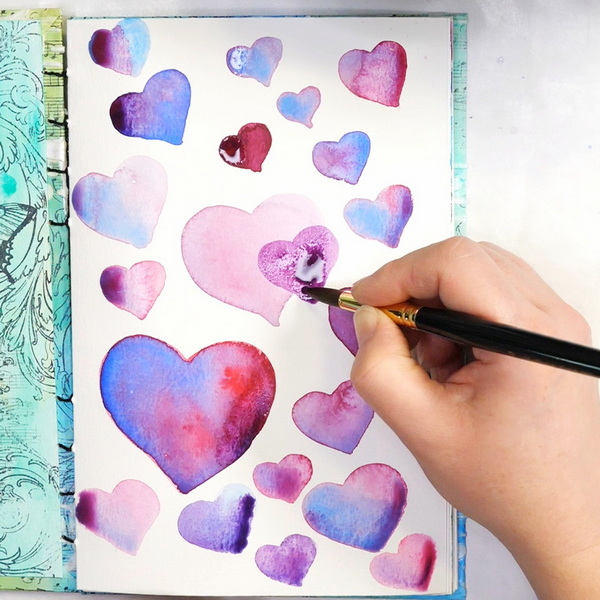
Watercolor paints can be layered, but it’s important that the first layer of paint is fully dry. When you add wet watercolor paint on top of the dry watercolor, this will cause the first layer of watercolor paint to rewet.
Paint in a second layer of hearts that overlaps some of areas of the first hearts. You’ll notice that you will get some interesting color mixes from the paint rewetting and mixing with the new paint.
If you paint Ultramarine Blue onto a Carmine Red heart, you’ll get a different hue than what you would get mixing the Ultramarine Blue and the Carmine Red together. The interesting thing about layering watercolors is that it gives you very different results than just mixing watercolors.
Continue to add in layers of hearts until you’ve filled the page and are happy with the final look.
For more information about color mixing, check out this article where I share many more tips and tricks for watercolor mixing!
Add in Journaling or a Sentiment
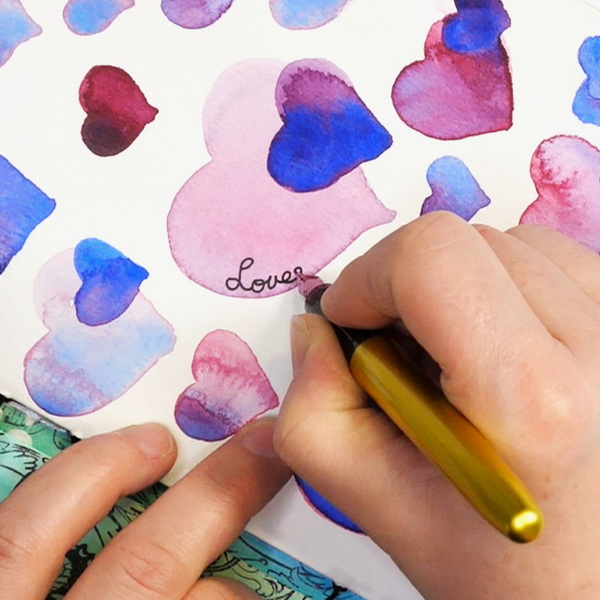
At this point you can choose to add journaling or a sentiment to your page. For this project, I added in the word “love” to one of the hearts. You can also add in journaling between the hearts or around the edges the hearts. There’s lots of interesting journaling options.
If You’re Not Sure What to Write
Sometimes the writing can be the hard part of an art journaling page. For this project, I wanted to talk about love. I want to journal about the beautiful times that people have shown love to me and think about how I can show love to others.
Valentine’s Day is often seen as a celebration of love, but I think it can be more than giving candy hearts and flowers. As I have several family members that have their birthdays on February 14th, it’s always been a day to celebrate someone’s else’s special day.
So Valentine’s Day doesn’t just have to be the celebration of love between 2 people, it can be an opportunity to love on those around you. Think about what you might do to surprise or encourage someone this Valentine’s Day. Is there someone who has gone through a loss or is feeling lonely? Is there someone that you can brighten their day in some small way?
This art journal page can easily be created as a watercolor card instead. This could be an opportunity to bless someone with a beautiful handmade card to brighten their day. There are so many little ways that you can be an encouragement to someone this Valentine’s Day and make their day just a bit brighter!
Any Questions?
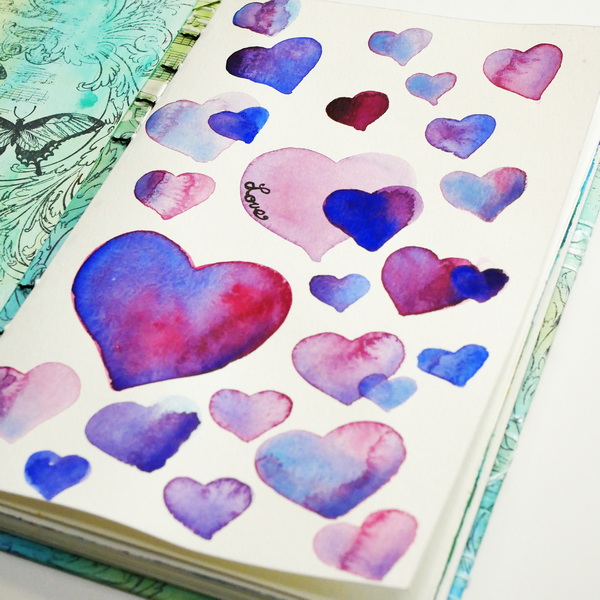
Any questions about how to use your watercolor paints or how to get comfortable with your watercolors? I’d love to hear if you have any questions or comments about what I shared. I hope that you have a lovely Valentine’s Day and that it’s an opportunity for you to feel loved or to show love to someone else.
Project Supply List
Recommended Watercolor Paints
- Quality student-grade range
- 40+ colors, including modern and historic pigments
- Strong tint strength
- Reliable transparency and lightfastness
- Uniform consistency for beginners and students
- Quality student-grade range
- 40+ colors, including modern and historic pigments
- Strong tint strength
- Reliable transparency and lightfastness
- Uniform consistency for beginners and students
Project Materials
- 24 ergonomically slanted wells with two (2) generous mixing areas
- Removable mixing tray for easy cleaning
- Colors appear the same on both the palette and watercolor paper
- Leakproof and airtight palette for watercolor or oil paint keeps colors fresh for weeks
- Acid-free
- Made in the USA
- Cold Press 140lb paperweight
- Versatile brushes for all media
- Long-lasting synthetic filaments
- Lacquered brush handle
- Made by hand in Germany
Perfect for adventurous artists, this water pot expands on site then collapses for transport. It's also easy to clean and store. Ridges around the rim keep brush handles separated and organized while you're painting.
- Affordable entry-level pens with an elevated aluminum body
- Ultra-smooth, beginner-friendly steel nib
- Patented cap design keeps ink fresh
- Silky, scratch-resistant finish
Waterproof carbon ink cartridges for the Platinum Plaisir Fountain Pen.














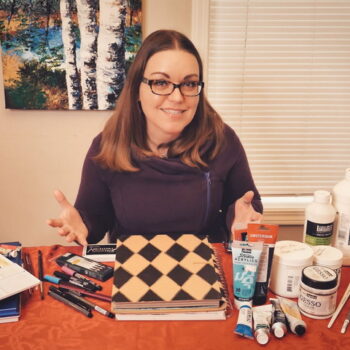
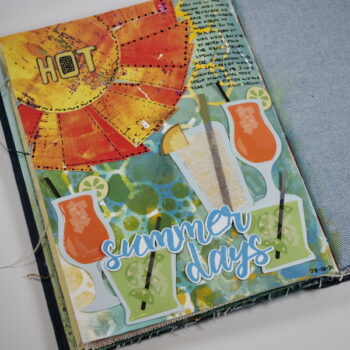
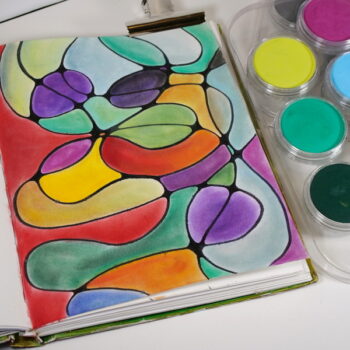
2 Comments
AnnMarie Hall
Honestly, Nadine, it’s like you read my mind. I just bought a new set of watercolors and love your suggestions. I really appreciate the time and effort you put into your blog posts and YouTube videos. They are so helpful and inspiring to me! Thank you!!!
Nadine Milton
I’m so glad that this was helpful to you! You’re welcome and I’m just so happy that you’re finding them inspiring! Thanks for letting me know that you enjoyed this post!